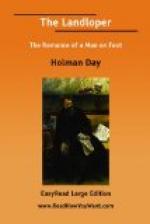Farr continued on his way, opening his book.
“If I ever see you again—” blustered the lover.
“I sincerely hope that will never happen,” remarked the stranger, without turning his head. “Instinct of the purely animal sort tells me that if our paths cross in this life it will be very bad for one or the other.”
When Farr was in the highway he fumbled in his pocket and found the withered rose. He tossed it away among the roadside bushes.
But after he had gone on his way for some distance he retraced his steps and hunted in the bushes for a long time on his hands and knees until he found the poor little keepsake.
He put it carefully into the deepest pocket he could find in his newly acquired habiliments and trudged on down the world.
VI
A MAN ON FOOT AND A MAN IN HIS CHARIOT
A blatant orator, haranguing passionately, attracted two new auditors.
A tall young man sauntered to the edge of the little group in the square and listened with a smile which indicated cynical half-interest.
An automobile halted on the opposite side of the group. A big man sat alone in the tonneau.
He began to scowl as he listened.
The young man continued to smile.
The big man was plainly a personality. He was cool and crisp in summer flannels—as immaculate as the accoutrements of his car.
In face and physique the young man was plainly not of that herd near which he stood.
His glance crossed that of the man in the car; he met the scowl with his smile.
Like a kiln open to the hot glare from a brassy sky or an oven where the July caloric blazed like a blast from the open mouth of a retort—such that day seemed Moosac Square in the heart of the cotton-mill city. High buildings closed in its treeless, ill-paved, dirty area. The air, made blistering by the torch of the sun, beat back and forth between the buildings in shimmering waves.
In the center of the square the blatant orator balanced himself on a stone trough which was arid and dust-choked. He harangued the group of unkempt men; sweating, blinking, apathetic men; slouchy men; men who were ticketed in attire and demeanor with all the squalid marks of idlers, vagrants, and the unemployed.
The man on the trough was of the ilk of the men who surrounded him. His face was flaming with the heat and with his vocal efforts. Perspiration streamed into his eyes, his voice was hoarse with shouting, but he had the natural eloquence of the demagogue. He was delivering the creed of the propaganda of rebellious poverty, the complaints of the dissatisfied, the demands of the idle agitators. He spiked his diatribe with threats flavored by anarchy. He pointed to policemen who had taken refuge in strips of shade which had been cast grudgingly by the high buildings. He reminded his hearers that those policemen had just driven them out of the tree-shaded parks. There the selfish rich folks were loafing under the trees. Poor folks were herded down the street and were forced to hold this meeting in that Gehenna, so he averred.




